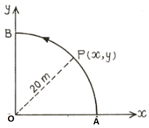G L Mittal and TARUN MITTAL Solutions for Chapter: Uniform Circular Motion, Exercise 3: FOR DIFFERENT COMPETITIVE EXAMINATIONS
G L Mittal Physics Solutions for Exercise - G L Mittal and TARUN MITTAL Solutions for Chapter: Uniform Circular Motion, Exercise 3: FOR DIFFERENT COMPETITIVE EXAMINATIONS
Attempt the practice questions on Chapter 12: Uniform Circular Motion, Exercise 3: FOR DIFFERENT COMPETITIVE EXAMINATIONS with hints and solutions to strengthen your understanding. ISC Physics Class XI Part 1 solutions are prepared by Experienced Embibe Experts.
Questions from G L Mittal and TARUN MITTAL Solutions for Chapter: Uniform Circular Motion, Exercise 3: FOR DIFFERENT COMPETITIVE EXAMINATIONS with Hints & Solutions
A small block of mass is moving in a circular area of radius . The block slides along the track without topping and a frictional force acts on it in the direction opposite in the instantaneous velocity. The work done in overcoming the friction up to the point Q as shown is the figure below is
(Take the acceleration due to gravity )
The speed of the block when it reaches Q is
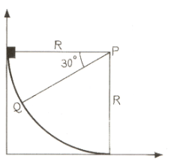
A small block of mass is moving in a circular area of radius . The block slides along the track without topping and a frictional force acts on it in the direction opposite in the instantaneous velocity. The work done in overcoming the friction up to the point Q as shown in the figure below is
(Take the acceleration due to gravity
The magnitude of normal reaction, when the point is at Q
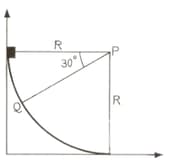
A bob of mass M is suspended by a massless string of length L. The horizontal velocity v at position A is just sufficient to make it reach the point B. The angle at which the speed of the bob is half of that at A, satisfies:
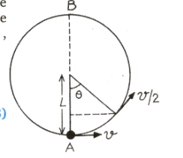
A stone tied to string of length is whirled in a vertical circle with the other end of the string at the centre. At a certain instant of time the stone is at its lowest position and has a speed The magnitude of the change in velocity as it reaches a position, where the string is horizontal is
A wire, which passes through the hole in a small bead, is bent in the form of quarter of a circle. The wire is fixed vertically on ground as shown in the figure. The bead is released from near the top of the wire and it slides along the wire without friction. As the bead moves from A to B, the force it applies on the wire is
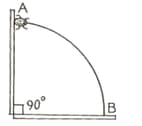
A sphere is rolling without slipping on a fixed horizontal plane surface. In the figure, A is the point of contact, B is the centre of the sphere and C is its topmost point. Then:
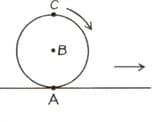
a particle in uniform circular motion the acceleration a at a point on the circle of radius is (here 'v' is the speed of the particle and is measured from the -axis)
A point P moves in counter-clockwise direction on a circular path as shown in the figure. The movement of ′P′ is such that it sweeps out a length where is in metres and is in seconds. The radius of the path is 20 m. The acceleration of ′P′ when is nearly.

